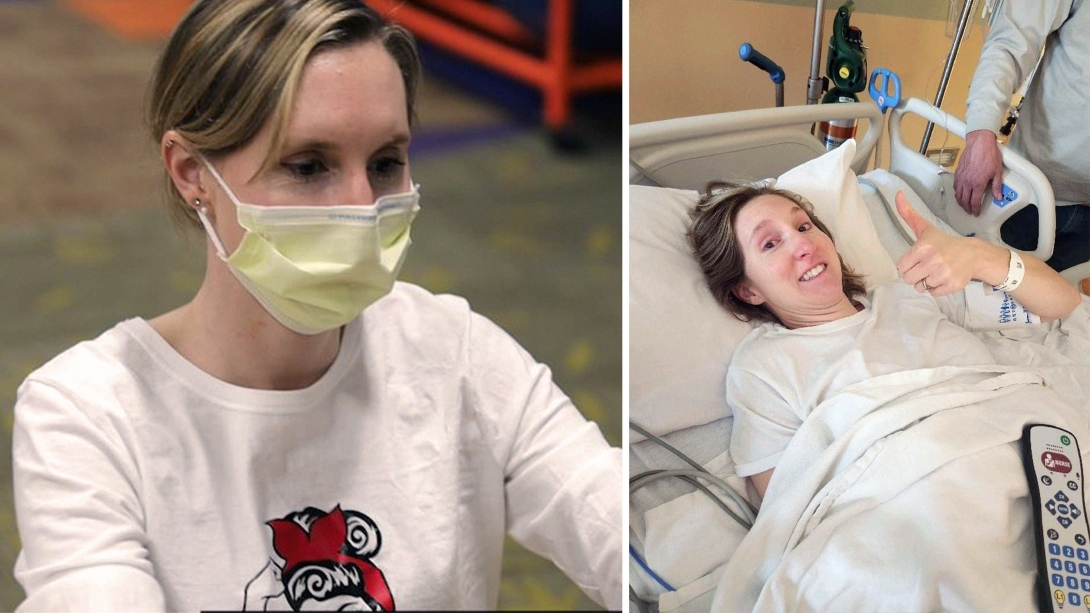With only minutes to spare, a mom of two is back on her feet thanks to fast action
5:00 AM
Author |
Tiffany Brunner of Eaton Rapids woke up early to exercise before her two young children got out of bed on a December day in 2022. That’s when everything changed.
“I started putting my hair up in a ponytail, and then I just remember looking in the mirror, and I just kind of lost all my balance and strength, and I just kind of fell over,” Tiffany said.
At the shockingly young age of 34, Tiffany had suffered a stroke.
Her story is a vital lesson in how a quick response and the leading-edge care she received at E.W. Sparrow Hospital’s Comprehensive Stroke Center made all the difference.
A race for help
Tiffany remembers laying on the bathroom floor for what seemed like minutes, unable to move. Heat from a nearby air duct gave her some comfort. But that too would not last.
“I was able to reach for the door handle and open it a little bit and yell for my husband. And it was when I yelled for him that I couldn't feel half of my face,” she said.
It was a shock of a lifetime. At that moment, she knew minutes mattered most.
Tiffany’s husband picked her up off the bathroom floor, put her in their family car and raced her to a nearby hospital. Unable to appropriately treat her there, doctors immediately called for an ambulance and alerted E. W. Sparrow Hospital in Lansing, part of University of Michigan Health.
“Fifty percent of strokes present with a clot in a large vessel in the brain, and these don't respond very well to the old treatment, the IV clot busting medicine,” said Anmar Razak, M.D., medical director of the Sparrow Comprehensive Stroke Center. “And so nowadays, we do surgery, and what we do is we rush them into the hospital, into the cath lab. We quickly get access through the blood vessels and get up to where the clot is and pull it out.”
Recovery and a second surgery
Following the emergency procedure, Tiffany spent several days in the intensive care unit at Sparrow and Mary Free Bed at Sparrow.
“I was definitely pretty scared, but it was nice when everybody always introduced themselves, like, who they were and always said that they would take care of me. And the nurses, I remember them holding my hand and apologizing if things were cold or sticking things on,” said Tiffany.

“I was really lucky. I had left-sided weakness, but right away, they were insistent on getting up and walking and having me do exercise like lunges. I think the most difficult tasks were balancing,” she said.
Cardiologists from Sparrow’s Thoracic Cardiovascular Institute later discovered and surgically treated a cause for the stroke, an undiagnosed hole in her heart.
Tiffany continues to participate in occupational therapy at AL!VE, a lifestyle center run by Sparrow Eaton Hospital in Charlotte. She has already made a remarkable recovery.
“I was able to pretty much gain my whole left side back, and I'm just very grateful for Dr. Razak, my therapist, and everyone who has helped me along the way,” she said.
Life isn’t the same for Tiffany. She faces daily challenges and reminders of the traumatic experience.
“I would work remotely, but it was still an eight-hour day. The kids get home and then you’re rushing off to sports, this way and that way and then you’re finally getting home at 9 o’clock and going to bed. I can’t really do that anymore. The fatigue is really what is affecting me the most. I just have to take a nap if I’m going to function.”
With a stroke, every minute counts
“There are so many things that patients need to fall into place to be functional and independent again after a stroke and they always come down to speed and time,” said Razak.
Time is brain - meaning each moment that a stroke goes untreated, the nervous tissue in the brain is rapidly and irreversibly damaged.
There are easy ways to remember the warning signs and symptoms of a stroke, like FAST, which stands for Facial drooping, Arm weakness, Speech difficulties, and most importantly, Time.
Use these simple tasks to test for symptoms of a stroke:
- Face – Ask the person to smile. Does one side of the face droop?
- Arms – Ask the person to raise both arms. Does one arm drift downward?
- Speech – Ask the person to repeat a simple sentence. Are the words slurred? Can he/she repeat the sentence correctly?
- Time – If the person shows any of these symptoms, time is important. Call 911 or get to the nearest hospital that offers the best treatment available.
Learn more about leading-edge stroke care at Sparrow, part of University of Michigan Health.

Explore a variety of health care news & stories by visiting the Health Lab home page for more articles.

Department of Communication at Michigan Medicine
Want top health & research news weekly? Sign up for Health Lab’s newsletters today!





